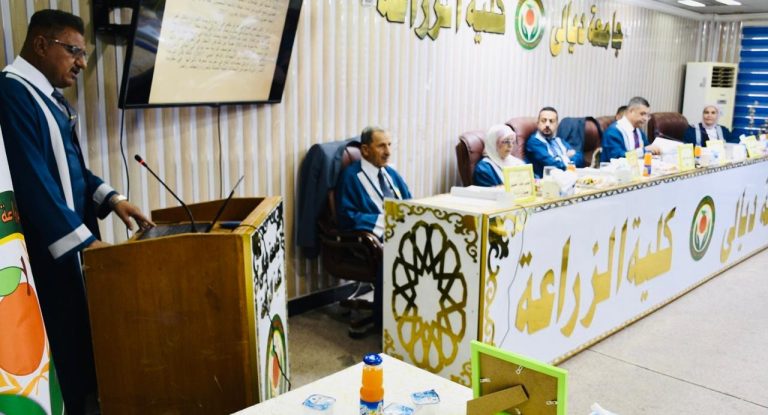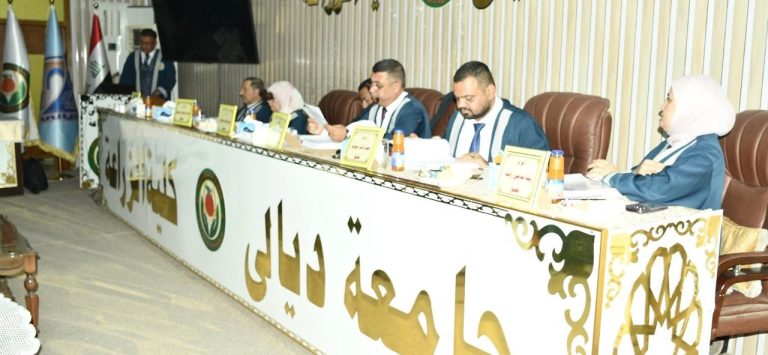A doctoral dissertation at the College of Agriculture

The College of Agriculture at the University of Diyala discussed a doctoral dissertation entitled “The Effect of Spraying with Certain Nutrients and Anti-transpirants on the Vegetative and Fruit Characteristics and Storage Potential of Ibrahimi Variety Apples.” The study, presented by the student Hamid Rashid Mullan, aimed to assess the plant’s response to foliar application of five nutrient levels: chelated iron, nano-iron, regular calcium chloride, and nano-calcium carbonate. Additionally, three anti-transpirants were evaluated: kaolin and potassium silicate, and their effects on plant growth and yield were studied. The experiment was conducted with two factors and three replications.
The study reached several conclusions, including the following: Spraying with nano-calcium carbonate significantly improved several vegetative and fruit characteristics, such as the number of leaves, leaf area, total leaf area per plant, calcium and carbohydrate content in the leaves, carbohydrate content in the branches, fruit weight, fruit size, yield per plant, fruit firmness, fruit length, fruit diameter, and the fruit’s carbohydrate, nitrogen, and calcium content. Chelated iron spraying, on the other hand, significantly enhanced the number of flowers, fruit set percentage, vitamin C content, and total number of fruits. Nano-iron application resulted in the highest significant increase in leaf chlorophyll content, iron content in both leaves and fruits, total soluble solids (TSS), and total titratable acidity (TA) of the fruits.
Spraying with potassium silicate anti-transpirant produced the highest values in the following parameters: number of leaves, leaf area, total leaf area per plant, calcium, carbohydrates, chlorophyll, and iron content in the leaves, carbohydrate content in the branches, number of flowers, fruit set percentage, fruit weight, fruit size, yield per plant (for both seasons), number of fruits (second season only), fruit firmness (first season only), fruit length, fruit diameter, total soluble solids, total titratable acidity, and calcium content in the fruits (first season). Meanwhile, kaolin anti-transpirant significantly increased the number of fruits (first season), plant yield (first season), and the fruits’ vitamin C and nitrogen content.
The interaction between nano-calcium carbonate and potassium silicate spraying led to a significant increase in the number of leaves, leaf area, total leaf area per plant, calcium and carbohydrate content in the leaves, carbohydrate content in the branches, fruit set percentage, fruit weight, fruit size, yield per plant, fruit firmness, fruit length, fruit diameter, carbohydrate, nitrogen, and calcium content in the fruits.
The results of the second experiment concluded the following: Spraying with nano-calcium carbonate significantly improved most of the stored fruit characteristics and produced the lowest values in total fruit decay, respiration rate, and total titratable acidity. Nano-calcium gave the highest values for fruit firmness, sugar content, vitamin C, and calcium content in the fruits. Nano-iron spraying resulted in the highest value for total soluble solids.
The study recommends the following: From the first (field) experiment:
-
Spraying with nutrients and anti-transpirants, and their interactions, improved most vegetative and fruit characteristics of the treated plants.
-
Nano-calcium carbonate excelled over all other nutrients by significantly improving most of the vegetative, quantitative, and qualitative yield characteristics.
From the second (storage) experiment:
-
Fruits treated with nano-calcium carbonate exhibited greater tolerance to cold storage conditions than those treated with other nutrients, by having the lowest decay rate, weight loss, respiration rate, and total titratable acidity. Additionally, they showed the highest values for sugar, vitamin C, and calcium content, which extended their storage and market life.
-
On the other hand, iron in both forms did not contribute significantly to maintaining the fruits or extending their storage and market life. The fruits deteriorated rapidly due to increased decay and respiration rates (in the case of chelated iron) and weight loss (in the case of nano-iron).
-
Spraying with kaolin extended the market life of the treated fruits, with a greater effect compared to potassium silicate. However, the interaction effects between treatments varied regarding the stored fruit characteristics.






